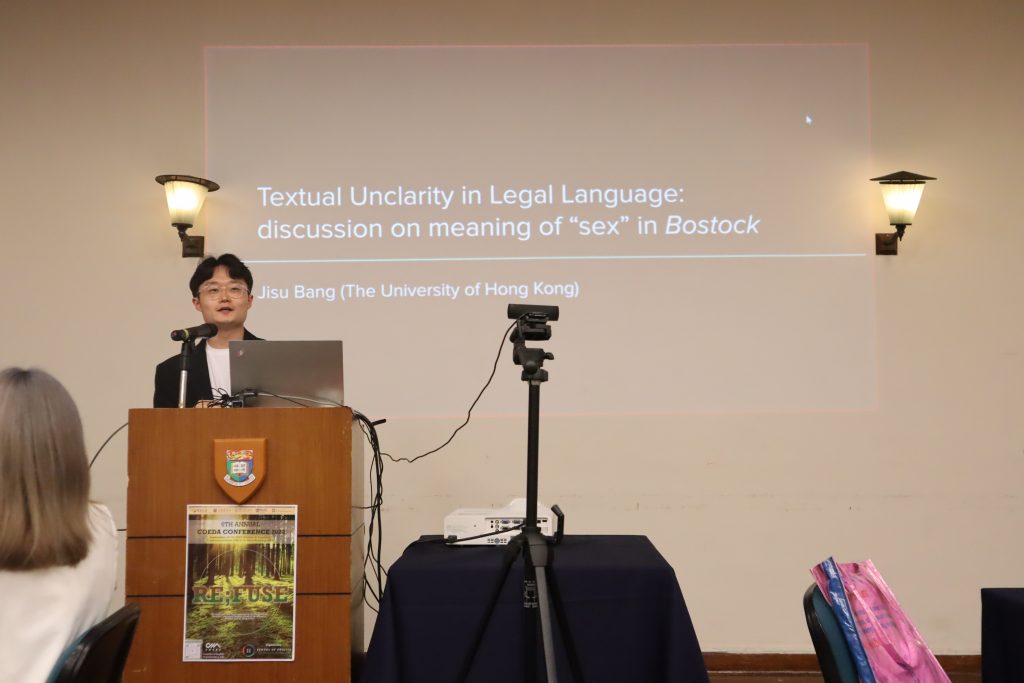Interview with Jisu Bang

Jisu Bang is a second-year MPhil candidate in the School of English, whose research interests lie in legal interpretation, the First Amendment, and the philosophy of rights. Jisu explores the textual ambiguity that arises from interpretations of legal terms. Currently, his project centers around the legal conflict between religious freedom and the non-discrimination rights of the LGBTQ community.
- How long have you been at HKU and what is the title of your project?
Although I am currently an MPhil student, I completed my undergraduate studies here at HKU, so technically I have been here for over five years. In broad terms, my thesis project focuses on textual ambiguity in legal language. It explores how words in written laws can be interpreted in multiple ways, leading to different conclusions. Currently, my specific focus is on the clash between the First Amendment rights of religious individuals and the non-discrimination rights of the LGBTQ community. I analyze how courts have interpreted the words in the relevant laws and explore alternative interpretations.
- What are the major themes in your research?
Legal interpretation, as a practice of textual analysis, is central to my research. There are various methods of reading the law. Since my research is based on cases from the U.S., it incorporates two major theories of legal interpretation in American jurisprudence: textualism and the Living Constitution. These theories serve as interlocutors to expand my discussion.
Among the many laws, I am focusing on interpreting the First Amendment, the Fourteenth Amendment, and the Civil Rights Act in particular. The major themes in my research can be summarized based on the subject matter of these laws, which include religious freedom, non-discrimination rights, and free speech. My thesis project explores the extent of these rights, especially when they come into conflict with one another, by employing various methods of interpretation.
- How and why did you become interested in your area of study?
I have always been interested in sociocultural issues, such as the one addressed in my thesis. I believe my unique background, growing up in a conservative family while attending a progressive international school, has played a significant role in shaping this interest. However, it was during an undergraduate course at HKU that I began contemplating the relationship between textual analysis and these issues, particularly when they manifest as legal conflicts. Prior to that, I had not even been aware of legal interpretation, let alone considered how a linguistic approach to law could contribute to the resolution of social conflicts.
- Why HKU? Is HKU a good place to do what you do?
Honestly, HKU was my first choice for graduate school application because I completed my undergraduate studies here. But more importantly, as I have said, my interest in my current research topic stemmed from a course I took at HKU. I am aware that what I am studying is uncommon in the School of English. In fact, not many English departments offer programs or supervision for interdisciplinary studies of law and language like mine. Fortunately, our School has experts in both disciplines who are able to supervise my research. The more I delve into my studies, the more I realize the importance of interdisciplinarity in various research fields. I find HKU to be very open, and even encouraging, when it comes to embracing interdisciplinary approaches.
- How do you see your current work fitting into your future career?
My current plan is to pursue a career in academia, focusing on theories of legal interpretation and the philosophy of rights, such as free speech. Because my thesis deals with these topics through a discussion of a contemporary sociocultural issue, I believe my work demonstrates the relevance of such topics in our lives and thereby the need to examine them. Additionally, as I have said, I believe in the value of interdisciplinary research, especially in the field of legal studies. I consider my current work to be an example of this interdisciplinary approach, and I hope it will serve as a solid foundation for my future academic career.
- Are there any popular publications you would recommend to our readers?
The first name that comes to mind is Andrew Koppelman. He has been writing about the legal clash between gay rights and religious beliefs for quite some time. One of my favorites of his is A Right to Discriminate?: How the Case of Boy Scouts of America v. James Dale Warped the Law of Free Association. If you are interested in legal interpretation, Reading Law: The Interpretation of Legal Texts by Antonin Scalia and Bryan Garner is a good read. This book explains various principles of constitutional, statutory, and contractual interpretation, using illustrations from actual cases.
- Outside of writing, what do you enjoy doing?
I am a huge fan of sports, enjoying both playing and watching football. Unfortunately, I am currently unable to participate in the former due to an injury. If anyone watches the Premier League, I am always open to discussing it. Apart from sports, I find great pleasure in engaging people in conversation, which may sound quite ordinary. However, I often find myself engrossed in lengthy discussions with friends, ranging from personal topics to scholarly debates. Time seems to fly by during these moments.
